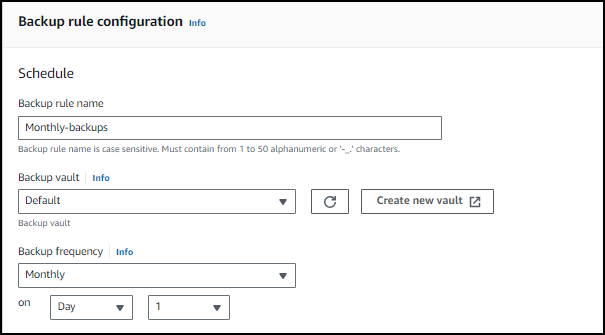
Amazon EBS Snapshots Archive is now available with AWS Backup

Previously available only in the Amazon EC2 console or Amazon Data Lifecycle Manager, this feature gives you the ability to transition your infrequently accessed Amazon EBS Snapshots to low-cost archive, long-term storage of your rarely-accessed snapshots that do not need frequent or fast retrieval…
Today we announce the availability of Amazon Elastic Block Store (Amazon EBS) Snapshots Archive with AWS Backup. Previously available only in the Amazon EC2 console or Amazon Data Lifecycle Manager, this feature gives you the ability to transition your infrequently accessed Amazon EBS Snapshots to low-cost archive, long-term storage of your rarely-accessed snapshots that do not need frequent or fast retrieval.
Amazon EBS Snapshots Archive in the AWS Backup console
Snapshots Archive with AWS Backup is only available for snapshots with a backup frequency of one month or longer (28-day cron expression) and a retention of more than 90 days. This is a protective measure to ensure that you don’t archive snapshots, such as hourly snapshots that wouldn’t benefit from the transition to the cold tier.
The ability to archive Amazon EBS Snapshots is a new parameter of the Lifecycle section of the AWS Backup Plans. You must explicitly opt into moving your Amazon EBS Snapshots to cold storage, because this has different properties of our existing cold storage including:
- Always converting an incremental backup to a full backup.
- Longer recovery time objective (RTO) (up to 72 hours).
- Limitations on the frequency of backups that can be transitioned to cold storage (monthly or greater).
Time in warm storage indicates how long the backups will remain in warm storage before they are transitioned to cold storage. Total retention period is the total time the backups will be retained by AWS Backup, and its value is the sum of both warm and cold storage. For backups in cold storage, the minimum retention period is 90 days. This is why the default total retention is 98 days (8 days in warm + 90 days in cold). The bar graph shows the total retention of your backups and where the backups will reside during that time. In the example shown in this graph, 8 days is in warm storage (red bar), and 90 days is in cold storage (blue bar).
To restore or use the archived Amazon EBS snapshot today (outside of AWS Backup), you have to follow a two-step process:
- Temporarily or permanently restore the snapshot from archive to standard tier.
- Once it’s in standard tier, call the
CreateVolumeAPI from the standard tier.
With this announcement, using either the AWS Backup console or the API to restore the archived Amazon EBS snapshot in AWS Backup, the following restore workflow applies:
- Enter the number of days you want to temporarily restore your snapshot from cold to standard tier.
- Choose your volume configuration.
The end result will be a restored EBS volume. You will not have to manually move the snapshot from cold to standard tier, then restore the volume, this will be done automatically for you.
Now available
Amazon EBS Snapshots Archive with AWS Backup is available for you today in all AWS Regions except China and AWS GovCloud (US).
As usual, you pay as you go, with no minimum or fixed fees. There are two metrics that influence Amazon EBS Snapshots Archive billing: data storage and data retrieval. You are charged for a 90-day period at minimum. This means that if you delete a snapshot archive or permanently restore it less than 90 days after creation, then we charge for the full 90-day period. The AWS Backup pricing page has the details.
– Veliswa
Author: Veliswa Boya



